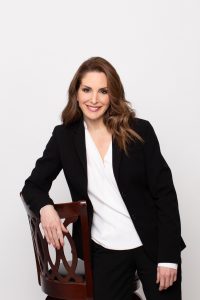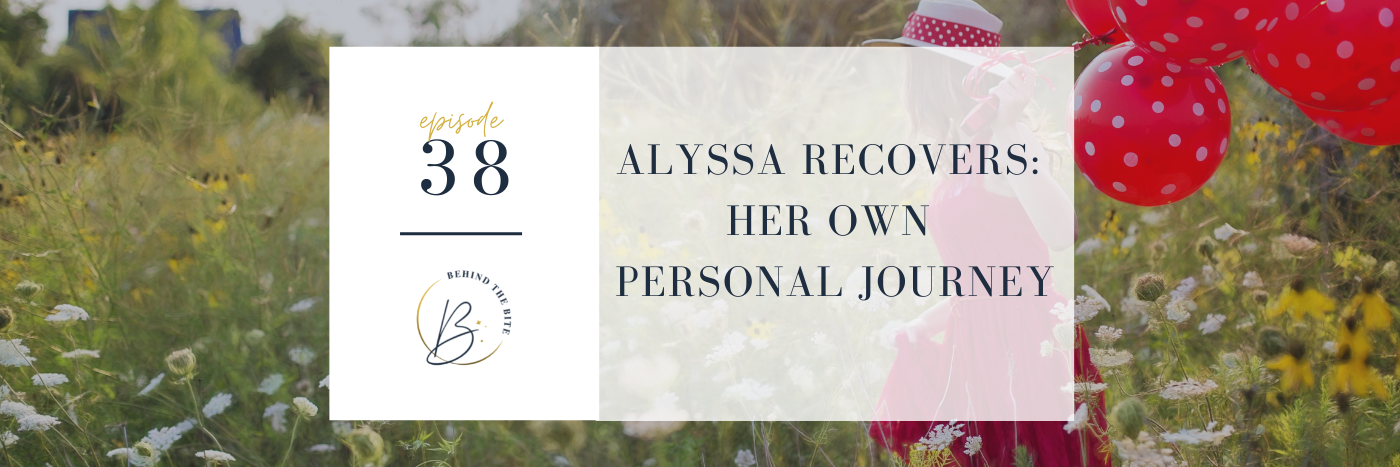How does creating trust and honesty with your support system disempower the eating disorder? Why should you be careful of the numbers? Why should you start looking at working out as a form of celebrating what your body can do?
In this podcast episode, Dr. Cristina Castagnini speaks with Alyssa about her own personal journey to recovery.
 MEET ALYSSA
MEET ALYSSA
Alyssa is 23 years old and she has been battling an eating disorder, depression, and anxiety for many years. She recently started her Instagram,
@alyssa_recovers to document her journey in recovery.
She will be starting a Clinical Mental Health Counseling Program in the fall to become a licensed counselor
To connect with Alyssa check out her
website, and follow her on
Instagram.
IN THIS PODCAST
- Obsessed with numbers
- Early stages pre-recovery
- Various support systems
- Today
Obsessed with numbers
Perfectionism is often included in eating disorders because it makes people focus on “tangible” results, which take on the form of numbers.
Becoming obsessed with numbers; hours exercised, calories lost, the caloric content of food, and so forth, are all activities that spur on eating disorders because patients then become more obsessed with numbers than with their health, which is often the reason they begin the behaviors which when left unchecked can turn into eating disorders.
Early stages pre-recovery
I definitely wasn’t ready to give up my eating disorder even though it was causing me tremendous pain, I still thought that “if I just did this, if I just stop binging then I could get back to where I was a year or two before. I can do it, I don’t need the help” … so I was very [angry] to be in treatment. (Alyssa)
When Alyssa started treatment, she was still in the mindset of the eating disorder and so she felt like it was a waste of time to be there since she did not think it applied to her.
This is another symptom of the eating disorder, the denial and the feeling that you are not doing anything wrong, and sometimes people might feel afraid to let go and recover from their eating disorder because it had become a part of what they knew. So much so, that being in recovery felt scary because it would be stepping away from what they knew.
At that point I was comfortable there, I was afraid of: “well, what’s going to happen when I don’t have this eating disorder anymore, what’s going to happen when I don’t “control” food and exercise?” … I was so afraid that not having it would be worse, which obviously now I know [that] having it is way worse. (Alyssa)
However, when you come to realize that the eating disorder is not healthy and that you are hurting your body and your mental health, you are ready to fully take an active part in and benefit from treatment.
Various support systems
Alyssa started seeing a counselor at her college while seeing her therapist back home. She had her parents who were supporting her and slowly made new friends at college while speaking with her boyfriend who was away at a different college.
Honesty with her family and counselors is what helped Alyssa to open up and disempower the eating disorder, because it thrives in secrecy, and through connecting with her parents and her counselors she was able to feel fully supported.
Today
Sometimes I think to myself “we still struggle after all these years?” but then I have to remind myself of all the other things I’ve overcome. I’m not self-harming anymore, I’m not restricting or purging, I’m not suicidal: all of these things I had overcome, so yes I still struggle with binging from time to time but I’m working on it. (Alyssa)
USEFUL LINKS
MEET DR. CRISTINA CASTAGNINI

I am a licensed Psychologist and Certified Eating Disorder Specialist.
While I may have over 20 years of clinical experience, what I also have is the experience of having been a patient who had an eating disorder as well.
One thing that I never had during all of my treatment was someone who could look me in the eye and honestly say to me "hey, I've been there. I understand".
Going through treatment for an eating disorder is one of the hardest and scariest things to do. I remember being asked to do things that scared me. Things I now know ultimately helped me to get better. But, at the time, I had serious doubts and fears about it.
If even one of my providers had been able to tell me "I know it's scary, but I had to go through that part too. Here's what will probably happen...." then perhaps I would not have gone in and out of treatment so many times.
My own experience ultimately led me to specialize in treating eating disorders. I wanted to be the therapist I never had; the one who "got it".
I will be giving you my perspective and information as an expert and clinician who has been treating patients for over 2 decades.
But don't just take my word for it...keep listening to hear the truly informative insights and knowledge guest experts have to share.
I am so happy you are here!
THANKS FOR LISTENING
Did you enjoy this podcast? Feel free to comment below and share this podcast on social media! You can also leave a review of
Behind The Bite on Apple Podcasts (previously) iTunes and subscribe!
 MEET ALYSSA
MEET ALYSSA I am a licensed Psychologist and Certified Eating Disorder Specialist.
While I may have over 20 years of clinical experience, what I also have is the experience of having been a patient who had an eating disorder as well.
One thing that I never had during all of my treatment was someone who could look me in the eye and honestly say to me "hey, I've been there. I understand".
Going through treatment for an eating disorder is one of the hardest and scariest things to do. I remember being asked to do things that scared me. Things I now know ultimately helped me to get better. But, at the time, I had serious doubts and fears about it.
If even one of my providers had been able to tell me "I know it's scary, but I had to go through that part too. Here's what will probably happen...." then perhaps I would not have gone in and out of treatment so many times.
My own experience ultimately led me to specialize in treating eating disorders. I wanted to be the therapist I never had; the one who "got it".
I will be giving you my perspective and information as an expert and clinician who has been treating patients for over 2 decades.
But don't just take my word for it...keep listening to hear the truly informative insights and knowledge guest experts have to share.
I am so happy you are here!
I am a licensed Psychologist and Certified Eating Disorder Specialist.
While I may have over 20 years of clinical experience, what I also have is the experience of having been a patient who had an eating disorder as well.
One thing that I never had during all of my treatment was someone who could look me in the eye and honestly say to me "hey, I've been there. I understand".
Going through treatment for an eating disorder is one of the hardest and scariest things to do. I remember being asked to do things that scared me. Things I now know ultimately helped me to get better. But, at the time, I had serious doubts and fears about it.
If even one of my providers had been able to tell me "I know it's scary, but I had to go through that part too. Here's what will probably happen...." then perhaps I would not have gone in and out of treatment so many times.
My own experience ultimately led me to specialize in treating eating disorders. I wanted to be the therapist I never had; the one who "got it".
I will be giving you my perspective and information as an expert and clinician who has been treating patients for over 2 decades.
But don't just take my word for it...keep listening to hear the truly informative insights and knowledge guest experts have to share.
I am so happy you are here!


Comments